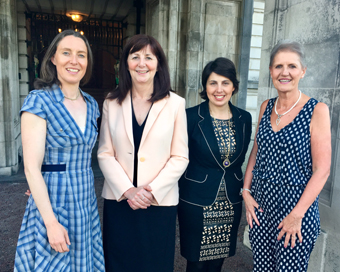14 June 2017
Cabinet Secretary Lesley Griffiths AM alongside CVO for Wales Christianne Glossop, BVA President Gudrun Ravetz and BVA Welsh Branch President Sarah Carr
Wales' forward-thinking approach to veterinary education, policy-making and rural partnerships is achieving successes for animal health and welfare across Wales, said the BVA President Gudrun Ravetz in her speech (PDF 239 KB) at BVA's annual Welsh Dinner at Cardiff City Hall on 13 June.
Addressing the dinner's 70 guests, including guest speaker Cabinet Secretary for Environment and Rural Affairs Lesley Griffiths AM, Assembly Members, key representatives from animal health and welfare organisations, and senior colleagues from across the veterinary profession, the BVA President acknowledged the “many unknown unknowns in the current political landscape”.
Speaking on Brexit, the BVA President said: “The outcome of the EU referendum last June had a profound impact on many of our veterinary colleagues …
"In Wales, one-fifth of the current veterinary workforce is made up of EU-graduated vets. This is why our first call was for the Government to guarantee the working rights for non-British EU vets and vet nurses currently working and studying in the UK, at the existing level, and with no time limit. And we were pleased to see this in many of the parties' manifestos in the run up to last week's General election.”
The BVA President highlighted commitments that Wales has already made in order to develop a strong veterinary workforce: “A strong veterinary workforce is vital to maintaining high animal welfare and food safety standards … And we look forward to the development of a new hub of veterinary expertise and excellence in Aberystwyth, which is bringing together the right resources to deliver training opportunities to Wales's vets of tomorrow.”
Throughout her speech, Ms. Ravetz emphasised the diverse experience and expertise within the veterinary profession: from “the work of individual vets in responsibly treating farm animals and pets in communities across the UK”; to “vets' frontline presence” in disease surveillance; and the vital role veterinary colleagues fulfil “enabling trade in animals and animal products … to retain customer confidence at a time when it's most needed”.
She praised the Welsh Government for maximising the skills and specialisms of the veterinary resource at national level: “In a profession where women now make up 60% of the workforce … we are pleased to see the appointment of more women and veterinary surgeons to the Animal Health and Framework Group, ensuring a better gender and expertise balance to meet the needs of animals in Wales.”
With the recent announcement of a reduction in new incidence of bovine TB in the Intensive Action Area (IAA), the BVA President praised the partnership working and considered approach that is helping to control this priority animal health problem: “Partnership between vets, farmers and government is paramount to controlling, and protecting against the disease … a 35% reduction in new incidence of TB in the Intensive Action Area is testament to the success of this joined-up working.
“The multi-control approach used in the IAA also demonstrates the importance of utilising a wide range of tools to most effectively tackle the disease. However, we do know that TB statistics can fluctuate, which is why, in light of the suspension of the badger vaccination project, we encourage the Welsh Government to include evidence-based control of badgers as part of the refreshed eradication strategy.”
Ms Ravetz also encouraged the Welsh Government to keep up the momentum on animal welfare issues where progress has already been made: “Last summer's independent review … builds on the evidence base that shows the welfare needs of wild animals can never be met in travelling circuses. BVA has long called for a ban on the use of wild animals in travelling circuses, and we would encourage the Welsh Government to set the legislative wheels in motion on this – as we have seen the Scottish Government do in recent weeks.”
On another BVA priority issue, the BVA President urged the Cabinet Secretary to make a commitment on mandatory CCTV in slaughterhouses to help ensure standards of welfare at slaughter match the high animal health and welfare standards being seen across other areas of Welsh policy: “We were disappointed that the Safeguarding Animal Welfare at Slaughter Task and Finish Group's report concluded that there was not a sufficient basis for making CCTV in Welsh abattoirs mandatory.
"While we know that CCTV is not the answer to all welfare concerns, it encourages the highest standards of animal welfare and good stockmanship – and is an essential tool in fostering a culture of compassion within abattoirs. We would urge the Cabinet Secretary to look at this issue again, and not miss the opportunity to set an example for the rest of the UK to follow.”
With the significant increase in the popularity of brachycephalic breeds and designer pets in recent years, Ms. Ravetz concluded her speech by urging everyone to help play their part in improving pet health and welfare: “We would urge you to join us in strongly encouraging your friends and family, and your constituents, to choose healthier breeds, or crossbreeds instead.
"Our combined voice can reach more animal owners with the right messages about pet welfare. Pets must be purchased with owners prioritising animal health and welfare – rather than making an impulse buy based on looks alone.”
The Cabinet Secretary for Environment and Rural Affairs, Lesley Griffiths AM, responded to the BVA President's speech.



